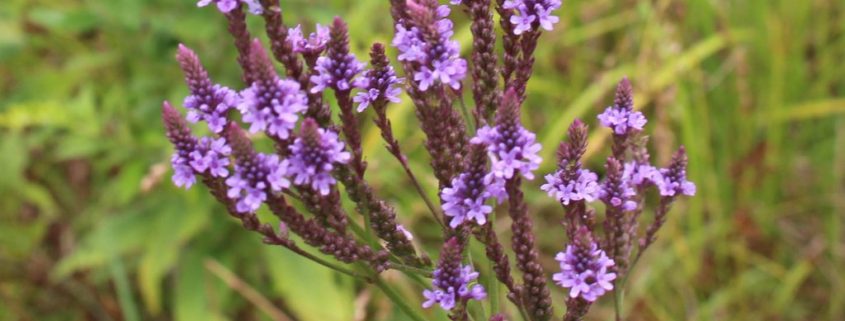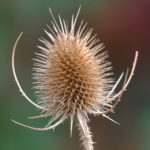Blue Vervain
(Verbena hastata)
Blue Vervain is a wonderfully relaxing plant with many uses. Native to the United States, Vervain is a beautiful perennial herb, growing 3-8′ tall. It prefers full sun and medium-wet soils. Often found in wet meadows and river bottoms in the Great Lakes region, Blue Vervain attracts butterflies and other pollinators and makes a great addition to your medicinal herb garden.
Family: Verbenaceae
Parts Used: aerial (above ground)
Energetics: bitter, acrid, cold, drying
Actions: bitter tonic, relaxing nervine, febrifuge, hypotensive, diaphoretic, emetic in large doses
Uses: a strongly relaxing nervine, vervain calms states of anxiety as well as hysteria and seizure. It is useful for occasions (or periods of time) when the sympathetic nervous system is stuck in overdrive, such as acute and chronic stress, or when body is shivering due to a fever. In fevers, the diaphoretic action of vervain opens the peripheral blood vessels to bring on a sweat and break a fever. It can also be useful following a debilitating illness to restore digestion and tone. As a bitter tonic, small doses of vervain are stimulating to digestive secretions, and decongestant to the liver and gallbladder. Vervain also has a reputation for helping to relieve hot flashes and night sweats.
Indications: hot flashes, night sweats, fevers, and any time the pores are tightly closed and the body needs to vent. Constitutionally speaking, vervain is suited to people who are intensely driven with perfectionist tendencies. These people often have very high and unreasonable expectations of themselves as well as others. Their strong mental and emotional focus draws energy away from the digestive and reproductive centers. And without that grounding lower body strength, they often overexert their upper bodies, resulting in tension in the upper shoulders and neck. Matthew Wood writes that vervain is for people with “strong above, weak below.” He also recommends it for women who have intense food cravings during menses (Earthwise Herbal: A Complete Guide to New World Medicinal Plants p.351).
Dosage: As a tincture, use 2-4 ml per day according to the British Pharmacopeia. Matthew Wood recommends 1-3 drops 1-3 times a day.
Contraindications: not recommended during pregnancy. It is not a nourishing or tonic herb so prolonged use and/or high doses are not recommended.
**This information is for educational purposes only and is not intended to diagnose or treat any disease**




Leave a Reply
Want to join the discussion?Feel free to contribute!